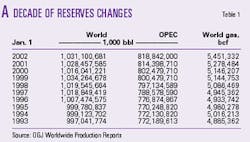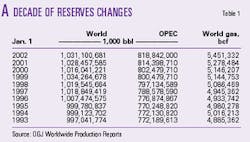Worldwide Report: World crude, gas reserves expand as production shrinks
Worldwide reserves of crude oil and natural gas increased in 2001. Crude oil and condensate reserves grew 3.7 billion bbl, following an increase of 12.3 billion bbl in 2000. Reserves of natural gas grew 3% to reach an all-time high for the second consecutive year.
Based on Oil & Gas Journal estimates gathered from an annual survey of companies and government agencies, total world reserves of oil as of Jan. 1, 2002, are 1.03 trillion bbl. Worldwide reserves of gas are 5.45 quadrillion cu ft.
OGJ also estimates that 2001 worldwide production of crude oil and lease condensate fell by 5% following an increase in output last year.
Tracking changes
The published reserves figures rely on survey responses and updates released by individual countries, which are not provided every year in many cases. OGJ changes its estimate for a particular country only when it receives evidence that a change is in order. Therefore, in a given reserves summary, a year-to-year change-or lack thereof-may not necessarily reflect a change that applies to the calendar year alone.
For example, there is an apparent big drop in reserves for Romania compared with Jan. 1, 2001, but the figures simply had not been updated in several years until Petrom SA submitted a reserve estimate to OGJ in October.
Pakistan's estimate would appear to have gained substantially in the past year, though in this case, too, it had not supplied an update in the past couple of years.
Many countries that submitted estimates this year cited re-evaluation as the reason for change in reserves, while some cited discoveries and economics or exploitation as the drivers of change. The Danish Energy Agency attributed the increase in Denmark's oil reserves to further development of producing fields.
OPEC's share of world oil reserves continued its steady climb (see Table 1). The organization now holds 79.4% of all crude and condensate reserves, up from 79.2% a year ago and 77.4% in 1993.
OPEC also controls 46% of total natural gas reserves vs. 44% a year ago.
Regional trends
Total oil reserves for the Asia-Pacific region were little changed as declines in Malaysia, New Zealand, and the Philippines offset large gains in Pakistan and Thailand. Gas reserves were up 19% on big increases in Australia and Indonesia.
Changes in estimates for Qatar and Saudi Arabia increased total Middle East gas reserves 6.5%, while oil reserves inched up less than 1%. An increase in reserves for Nigeria pushed Africa's oil reserves 2% higher.
In Europe, oil and gas reserves decreased slightly on declines in the UK, France, and Romania.
The most recent estimates from Bolivia and Cuba helped increase reserves in Latin America. Bolivia's Vice-Ministry of Energy & Hydrocarbons reported than proved oil reserves increased to 440.5 million bbl from 396.5 million bbl last year, while Cuba's Ministry of Basic Industry pegs that country's oil reserves at 750 million bbl, almost trebled.
North American reserves
EIA's most recent reserves report shows that proved oil reserves increased 1.3%, replacing 115% of production last year. EIA noted that most of the reserves additions came from the deepwater Gulf of Mexico Federal Offshore frontier area. Gas reserves increased 6%, by far the largest increase since EIA has been estimating US gas reserves.
The latest figures from Pemex show a 5% decline in Mexico's oil reserves and a 3% decline in the country's gas reserves. Proved oil reserves in Mexico now stand at 26.6 billion bbl, and proved gas reserves are 29.5 tcf.
The Canadian Association of Petroleum Producers last month reported that changes to reserves of oil and gas in Canada were mixed. Oil reserves increased 3%, while gas reserves were down 2%.
Production
OGJ estimates that worldwide production of crude and condensate fell this year to 63.8 million b/d from 67.2 million b/d. Actual production in 1999 was 64.7 million b/d.
OPEC oil production declined 14% from last year on three quota reductions totaling 3.5 million b/d. Middle Eastern output was down 17%.
A production drop of 6% is estimated for Western Europe, while production in Eastern Europe and the former Soviet Union is projected at 9.5% higher than a year ago, primarily as a result of much higher production volume in Russia.
Output in Africa, Asia-Pacific, and the Western Hemisphere declined marginally.

